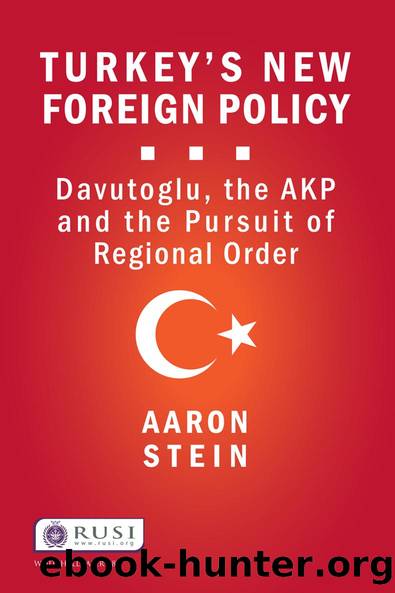Turkey's New Foreign Policy by Aaron Stein

Author:Aaron Stein [Stein, Aaron]
Language: eng
Format: epub
Tags: History, Military, General, Political Science, International Relations
ISBN: 9781317327080
Google: teEsCgAAQBAJ
Publisher: Routledge
Published: 2015-07-16T01:25:22+00:00
Turkish Isolation
After the overthrow of Ben Ali in Tunisia and Mubarak in Egypt, Turkey was portrayed as a potential model for the Arab countries in transition. The focus on the idea of a âTurkish modelâ, however, has distracted from Ankaraâs rather self-interested and uneven policies during the upheavals. Turkeyâs handling of Egypt differed considerably from its approach to Tunisia, which in turn was very distinct from its handling of the situation in Libya. In Tunisia, a cautious AKP was unsure of how to act, and only embraced regime change after it become clear that Ben Ali was certain to fall from power. In Libya, by contrast, the AKP prioritised its economic interests and chose to disregard the demands of first the protesters and then the rebels with the outset of the conflict. The AKPâs policy towards the Arab upheavals therefore cannot be described as an effort to promote democracy or to stand by the people against state oppression. Instead, it has been far more nuanced, based on assumptions made about a changing regional order and how the upending of the Arab worldâs political status quo would benefit the AKP.
Egypt was the exception to this rule. There, Turkey eagerly embraced regime change because of the AKPâs cool relationship with Mubarak and its belief that the installation of a like-minded political party would help to advance its regional interests, including the undoing of what intellectuals close to the party defined as the Camp David Order. The AKPâs fervent support for Morsi has since embroiled Turkey in numerous political proxy battles throughout the region. Moreover, it has seriously damaged its relationship with Saudi Arabia, the UAE and Jordan, without having amounted to much in return. Turkeyâs preferred party in Egypt, the FJP, has been overthrown and, with Morsi in prison, Sisi appears to be firmly in power.
Still, Turkey has been dismissive of the damage its Egypt policy has done to its foreign policy, instead embracing the idea that it stands to benefit in the long term, once the region inevitably returns to electoral politics in Egypt and the pressure for political change begins anew in countries throughout the Middle East. This perspective is based on three assumptions. First, the belief that the âera of nationalismâ will come to an end in the Middle East and a new crop of religiously conservative leaders will emerge, bringing an end to the existing Arab order. Second, the belief that these new religiously conservative leaders will look to Turkey â and more specifically, to the AKP â as a source of political inspiration. Third, the belief that wider religious conservatism will allow Turkey to expand its influence through a shared religious identity with like-minded states.
The interrelated events of the Arab upheavals, however, have combined to thwart Turkeyâs ambitions in this regard. In contrast to its previous position of influence in the regionâs post-revolutionary states, Ankara now finds itself embroiled in a proxy war in Libya, sidelined in Cairo, and unwelcome in Riyadh and Abu Dhabi. Indeed, even
Download
This site does not store any files on its server. We only index and link to content provided by other sites. Please contact the content providers to delete copyright contents if any and email us, we'll remove relevant links or contents immediately.
american english file 1 student book 3rd edition by Unknown(617)
Phoenicians among Others: Why Migrants Mattered in the Ancient Mediterranean by Denise Demetriou(613)
Verus Israel: Study of the Relations Between Christians and Jews in the Roman Empire, AD 135-425 by Marcel Simon(595)
Basic japanese A grammar and workbook by Unknown(584)
Caesar Rules: The Emperor in the Changing Roman World (c. 50 BC â AD 565) by Olivier Hekster(582)
Europe, Strategy and Armed Forces by Sven Biscop Jo Coelmont(524)
Give Me Liberty, Seventh Edition by Foner Eric & DuVal Kathleen & McGirr Lisa(501)
Banned in the U.S.A. : A Reference Guide to Book Censorship in Schools and Public Libraries by Herbert N. Foerstel(492)
The Roman World 44 BC-AD 180 by Martin Goodman(480)
Reading Colonial Japan by Mason Michele;Lee Helen;(471)
DS001-THE MAN OF BRONZE by J.R.A(467)
Introducing Christian Ethics by Samuel Wells and Ben Quash with Rebekah Eklund(464)
The Dangerous Life and Ideas of Diogenes the Cynic by Jean-Manuel Roubineau(458)
Imperial Rome AD 193 - 284 by Ando Clifford(457)
The Oxford History of World War II by Richard Overy(456)
Catiline by Henrik Ibsen--Delphi Classics (Illustrated) by Henrik Ibsen(442)
Language Hacking Mandarin by Benny Lewis & Dr. Licheng Gu(414)
Literary Mathematics by Michael Gavin;(409)
Brand by Henrik Ibsen--Delphi Classics (Illustrated) by Henrik Ibsen(401)
